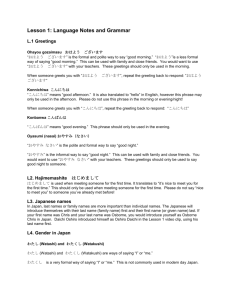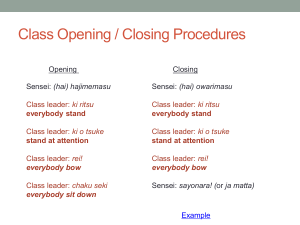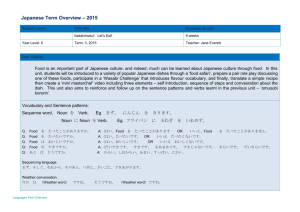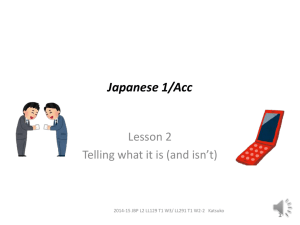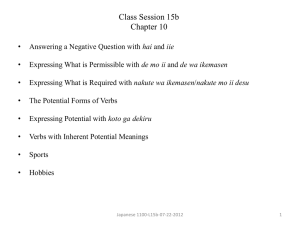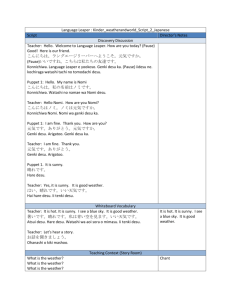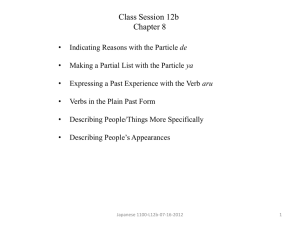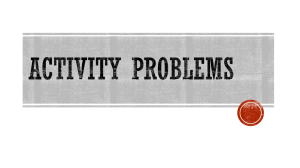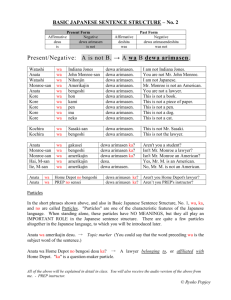File - Japanese Teaching Ideas
advertisement
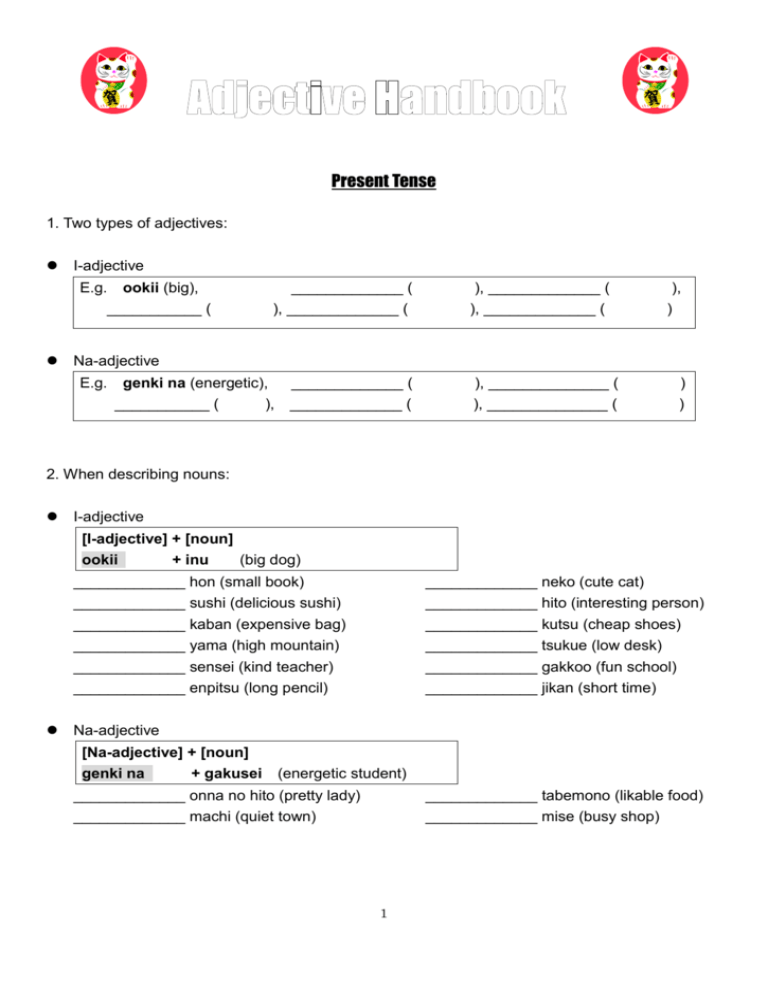
Present Tense 1. Two types of adjectives: I-adjective E.g. ookii (big), ___________ ( _____________ ( ), _____________ ( ), _____________ ( ), _____________ ( ), ) Na-adjective E.g. genki na (energetic), ___________ ( ), _____________ ( _____________ ( ), ______________ ( ), ______________ ( ) ) 2. When describing nouns: I-adjective [I-adjective] + [noun] ookii + inu (big dog) _____________ hon (small book) _____________ sushi (delicious sushi) _____________ kaban (expensive bag) _____________ yama (high mountain) _____________ sensei (kind teacher) _____________ enpitsu (long pencil) _____________ neko (cute cat) _____________ hito (interesting person) _____________ kutsu (cheap shoes) _____________ tsukue (low desk) _____________ gakkoo (fun school) _____________ jikan (short time) Na-adjective [Na-adjective] + [noun] genki na + gakusei (energetic student) _____________ onna no hito (pretty lady) _____________ machi (quiet town) _____________ tabemono (likable food) _____________ mise (busy shop) 1 Renshuu (Exercise) 1. Try the crossword puzzle. 2. Use adjectives and describe the following items. 1) __________otooto 2) ___________imooto (…… little brother) (…… little sister) 4) __________ biiru (…… beer) 5) __________ inu (…… dog) 3) ____________ kuruma (…..car) 6) ____________ ie (…… house) 3. Fill in the gaps and complete the setnences 1) Watashi wa ____________ mizu o nomimasu. (I drink cold water.) 2) Watashi wa ____________ imooto ga imasu. (I have a cute sister.) 3) Watashi wa ____________ koohii o nomimasu. (I drink hot coffee.) 4) Watashi wa ____________ ongaku ga suki desu. (I like quiet [soft] music.) 5) Watashi wa ____________ kuruma o kaimasu. (I’ll buy a new car.) 2 3. When used at the end of a sentence I-adjective Affirmative Negative E.g. ookii (big) Watashi no ie wa ookii desu. (My house is big.) E.g. ookii (big) Watashi no ie wa ooki i ku arimasen. (My house is not big.) takai: Watashi no kuruma wa ___________________ / _______________________________ (My car is expensive./ isn’t expensive.) yasui: Kono kaban wa _________________________ / ________________________________ (This bag is cheap./ is not cheap.) Na-adjective Affirmative Negative E.g. genki na (energetic, well, healthy) Gakusei wa genki na desu. (The student is well/ energetic.) E.g. genki na (energetic, well, healthy) Gakusei wa genki na dewa arimasen. (The student isn’t well/ energetic.) shizuka na: Kono machi wa _________________ / ____________________________________ (This town is quiet./ isn’t quiet.) suki na: Watashi wa supootsu ga _____________ / _____________________________________ (I like sports./ don’t like sports.) Renshuu (exercise) 1. Use the adjectives in the sentences. 1) Tanaka san no kaban wa _________________________________. (Tanak’s bag is cute.) 2) Suzuki san wa __________________________________________ (Suzuki is kind.) 3) Yamada san wa _________________________________________ (Yamada is busy.) 4) Watashi no gakkoo wa ____________________________________ (My school is big.) 5) Kono neko wa ___________________________________________ (This cat is small.) 2. Use the adjectives in the sentences. 1) Kyoo wa ______________________________________ (It’s not hot today.) 2) Suzuki san no ryoori wa __________________________ (Suzuki’s cooking isn’t delicious.) 3) Satoshi san no kuruma wa ________________________ (Satoshi’s car isn’t expensive.) 4) Kono hon wa ___________________________________ (This book isn’t new.) 5) Densha no kippu wa _____________________________ (The train ticket isn’t cheap.) 3 3. Use the adjectives in the sentences. 1) Watashi no kazoku wa ___________________________ (My family is well.) 2) Watashi wa niku ga _____________________________ (I dislike meat.) 3) Yamamoto san wa ______________________________ (Yamamoto is quiet.) 4. Use the adjectives in the sentences. 1) Mariko san wa __________________________________ (Mariko isn’t pretty.) 2) Watashi wa yasai ga _____________________________ (I don’t like vegetables.) 3) Kono machi wa _________________________________(This town isn’t lively.) 5. Use adjectives and answer the questions. 1) Q: Kyoo wa samui desu ka? (Is it cold today?) A: Kyoo wa ___________________________________________________________________ 2) Q: Sushi ga suki desu ka? (Do you like sushi?) A: Watashi wa sushi ga _________________________________________________________ 3) Q: Otoosan wa yasashii desu ka (Is your father nice?) A: __________________________________________________________________________ 4) Q: Nihongo wa tanoshii desu ka? (Is Japanese language fun?) A: __________________________________________________________________________ 5) Q: Gakkoo wa shizuka desu ka? (Is the school quiet?) A: __________________________________________________________________________ 6) Q: O-genki desu ka? (How are you? / Are you well?) A: __________________________________________________________________________ 6. Describe the pictures. 1) Uchuujin wa _______ ga _______________ (The alien has long arms.) 2) Uchuujin wa ____________________ (The alien has large eyes.) 3) __________________________________ 4) _____________________________ 4 Past Tense I-adjective Affirmative Negative E.g. ookii (big) Watashi no ie wa ooki i katta desu. (My house was big.) E.g. ookii (big) Watashi no ie wa ooki i ku arimasen deshita. (My house was not big.) takai: Watashi no kuruma wa ___________________ / _______________________________ (My car was expensive./ was not expensive.) yasui: Kono kaban wa _________________________ / ________________________________ (This bag was cheap./ was not cheap.) Na-adjective Affirmative E.g. genki na (energetic, well, healthy) Gakusei wa genki na deshita. (The student was well/ energetic.) Negative E.g. genki na (energetic, well, healthy) Gakusei wa genki na dewa arimasen deshira. (The student wasn’t well/ energetic.) shizuka na: Kono machi wa ______________________ / _______________________________ (This town was quiet./ wasn’t quiet.) suki na: Watashi wa supootsu ga _________________ / ________________________________ (I liked sports. / didn’t like sports.) Renshuu (Exercise) 1. Re-write the sentences from the present tense to the past tense. 1) Kinoo wa atsui desu. ⇒ Kinoo wa ____________________________________________(It was hot yesterday.) 2) Biiru wa oishii desu. ⇒ Biiru wa ______________________________________________(The beer was tasty.) 3) Watashi wa natsu ga suki desu. ⇒ Watashi wa ______________________________________________(I liked summer.) 4) Natsuyasumi wa tanoshii desu. ⇒Natsuyasumi wa ________________________________(The summer holiday was fun.) 5) Obaasan no ie wa furui desu. ⇒___________________________________(The old lady/grandmother’s house was old.) 6) Ojiisan no kuruma wa atarashii desu. ⇒____________________________________(The old man/ grandfather’s car was new.) 5 2. Describe the picture using the past-tense endings. E.g. O-cha wa atsu i katta desu. (The tea was hot.) 1) Obaasan wa … (Grandmother/old lady was …) 2) Otoosan wa … (Father was …) 3) Otoko no ko wa … (The boy was …) 4) 5) 6) 7) 8) 9) 10) 6
